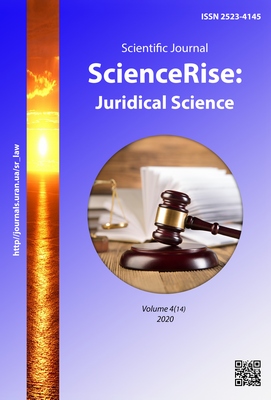National minority: analysis of the genesis of legal status
DOI:
https://doi.org/10.15587/2523-4153.2020.219376Keywords:
national minorities, human rights, minority rights, genesis, ethnocentrism, internationalization, nationalism, dichotomyAbstract
Global trends and global transformations, caused by the demands of modern life, the intertwining of economic, social, political and many other factors, have led to the gradual integration of European countries, the formation of a global information field, the growing interdependence of "national" economies. The genesis of the rights of national minorities is a closed issue for the general public, a historical path, taken by national minorities in the direction of establishing a modern system of human rights protection and building a new international order that has not only theoretical, but also practical significance.
At the same time, there are attempts to resist the processes of internationalization, autarky, recurrences of imperial thinking, nationalism and growing intolerance of members of the minority. Often, both at the household level and in the official political and legal doctrine, the wrong formula of ethnocentrism works, according to which it seems enough to "close borders" or "self-determine" to solve any problem, but life refutes these illusions, which is confirmed by the conclusions of the article.
It is no coincidence, that legal science has not yet developed a generally accepted concept of "national minority", and often in official documents and scientific works, national minorities are not separated from other social groups (linguistic, religious, racial and others) and from the broader category of "minority". It is obvious, that the problem of scientific definition of this concept is determined by the complexity and multifaceted problems of building a democratic state, governed by the rule of law
References
- Scheu, H. C. (1998). Ochrana národnostních menšin podle mezinárodního práva. Praha: Karolinum – nakladatelství Univerzity Karlovy, 100.
- Macartney, С. (1934). National States and National Minorities. London: Oxford University Press, 604.
- Rymarenko, Yu. I., Vivcharyk, M. M., Kartunov, O. V., Kresina, I. O., Rymarenko, S. Yu., Teleshun, S. O. et. al.; Rymarenko, Yu. I. (Ed.) (2000). Etnos. Natsiia. Derzhava: Ukraina v konteksti svitovoho etnoderzhavnytskoho dosvidu. Kyiv: In-t derzhavy i prava im. V. M. Koretskoho NAN Ukrainy, 516.
- Platon. Gosudarstvo. Zakony. Politika (2002). Moscow: Misl, 423–485.
- Tsitseron. Dialogi o zakonakh (2000). Moscow: Misl, 175.
- Ellinek, G. (1998). Pravo menshinstva. Moscow: Bek, 76.
- Danevskyi, V. P. (1992). Systemy politychnoi rivnovahy i lehitymnosti i pochatok natsionalnosti v yikh vzaiemnomu zviazku. Istoryko-dohmatychne doslidzhennia. Moscow: Nauka, 334.
- Hrushevskyi, M. (1991). Khto taki ukraintsi i choho vony khochut. Kyiv: Znannia, 526.
- Fadeicheva, M. (2004). Etnopoliticheskie kontseptsii etnicheskikh obschnostei i individov. Ekaterinburg, 32–33.
- Riaboshapko, L. (2001). Pravove stanovyshche natsionalnykh menshyn v Ukraini (1917–2000). Lviv: Vydavnychyi tsentr LNU im. Ivana Franka, 484.
- Stalin, Y. (1952). Marksyzm i natsionalne pytannia. Kyiv, 32–33.
- Abdulkarymov, H. (2007). Istorychni trendy etnopolityky ta etnosotsiokulturnykh protsesiv. Moscow, 87–89.
- Natsionalni vidnosyny v Ukraini u XX st. Zbirnyk dokumentiv i materialiv (1994). Kyiv: Nauk. dumka, 440–442.
- Stanislav, K. (2018). Pravove poniattia "natsionalnosti" v Ukraini ta sviti. Yurydychnyi visnyk Ukrainy, 28, 13.
- Pidberezhnyk, N. P. (2018). Vyklyky ta zahrozy u sferi etnopolitychnykh vidnosyn v Ukraini na suchasnomu etapi. Visnyk Natsionalnoi akademii derzhavnoho upravlinnia pry Prezydentovi Ukrainy, 2, 68–75.
Downloads
Published
How to Cite
Issue
Section
License
Copyright (c) 2020 Olena Golovash

This work is licensed under a Creative Commons Attribution 4.0 International License.
Our journal abides by the Creative Commons CC BY copyright rights and permissions for open access journals.
Authors, who are published in this journal, agree to the following conditions:
1. The authors reserve the right to authorship of the work and pass the first publication right of this work to the journal under the terms of a Creative Commons CC BY, which allows others to freely distribute the published research with the obligatory reference to the authors of the original work and the first publication of the work in this journal.
2. The authors have the right to conclude separate supplement agreements that relate to non-exclusive work distribution in the form in which it has been published by the journal (for example, to upload the work to the online storage of the journal or publish it as part of a monograph), provided that the reference to the first publication of the work in this journal is included.








